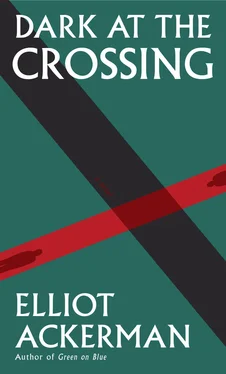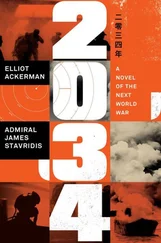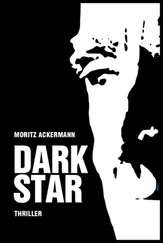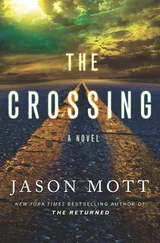“I won’t,” Haris said softly.
Amir wiped his face with the sleeve of his pajamas and drank a glass of water. “If you’re taking her on this journey,” he said, “you should understand what happened between us.”
Haris said nothing.
“I suppose it began with the revolution. Back then we named all the protests — the Friday of Martyrs, the Friday of Rage, the Friday of Steadfastness. Many times since, I’ve wished I could grab my old self by the shirt collar and shout in my own face: ‘Idiot! Do you know what it means to be a martyr? You march for the honor of having your life destroyed.’ Even if I’d told myself, it wouldn’t have mattered. When you start marching, you stop listening. I never listened when Daphne came to me with her fears. I answered her with slogans such as ‘History will remember those who chose change in the moment of change.’ I asked her how I could call myself a man if I abandoned my country’s cause. At night, in the darkness of our bedroom, we argued. I told her she could leave and I’d stay. I never once thought of her decisions. How could she call herself a wife if she abandoned her husband? And of course there was Kifa.
“Soon soldiers replaced students and operations replaced protests. As violence spread, most democratic activists took up arms with the Free Army. I’m no soldier, so I involved myself with the Syrian National Council, but this political wing of the Free Army didn’t matter. Generals matter in a war, not activists. When the government closed the schools in rebel territory, Daphne and a few other mothers started their informal kindergarten, rotating their classes from one apartment to the next. On the days we hosted, I would stay home and help Daphne. She’d usually ask me to run an errand or two, but she didn’t need much. She just wanted a man in the house with so many children there.
“When the war entered its second year, a Free Army brigade needed some space for its headquarters. Eager to support the cause, I volunteered the bottom floor of our apartment building. Daphne was furious. She didn’t want soldiers so near the children, and at all hours these men came and went, taking messages to and from the front, loading trucks with ammunition and food. Whenever the soldiers saw the kindergarten parade inside, some soft part of them came alive, and they found smiles or even sweets to hand out. But a few were beyond such kindnesses. I remember one in particular. He was young, barely a man. He’d lost a leg below the knee, and it pained him to walk. I only saw him when he stood outside to smoke. For some reason, courtesy, I assumed, the soldiers never smoked inside our apartment building.
“When Daphne sent me on errands, I dreaded seeing the legless soldier. He’d sit on our building’s front step, his wooden prosthetic extended in front of him. He’d always taunt me, a cigarette dangling from his lips. If I carried milk for the children, he’d say: ‘Where is your cow, milkmaid?’ If I carried juice, he’d ask: ‘Is your orchard far from here?’ No matter what he said, he’d always end the same way: ‘You’ll walk to the front soon enough.’ Then he’d point at his missing leg. ‘Just remember the walk there is easier than the walk back.’
“Educated, idealistic men began our revolution, but every time I looked into this boy soldier’s face and he spoke his clipped Arabic, with his cigarette yellowing his teeth, I knew the uneducated would have the final say in my country’s future.”
Amir became silent.
“It’s all right,” said Haris. “You don’t have to tell me the rest.”
“You’re right, I don’t,” Amir answered sharply. “But you want to fight, you want to be like that legless boy sitting in front of my building. You’re not taking Daphne to search for our daughter, you’re taking her to search for a grave, and perhaps to lie down in one of your own. You should listen to how this ends.”
Amir continued: “One morning when Daphne was hosting the kindergarten, she gave me a list of groceries a half an hour before Kifa’s classmates arrived. As I walked down the stairwell, I smelled smoke. The boy soldier jostled a locked door on the ground floor, with a lit cigarette dangling from his lips. He blew smoke in my face and said: ‘You want me to stand in the cold for your safety, milkmaid?’ At the time, I didn’t know what he meant. The padlock’s shackle popped open, and he stepped inside as I went on my errand.
“I was at the market a few blocks away when an explosion came from the direction of my apartment. I ran outside, and what I saw stopped me — a gap in the cityscape. Blue sky replaced where our building had been. I stared into it. If regime planes had bombed our apartment, there would likely be a second pass. Another explosion split the quiet. Frantically, I searched for a plane but found none. The blast occurred in the same place as the first. This was too accurate. The air filled with a few weak, choked screams. Before I could run home, another blast erupted from the earth, then another right after it. Something within the building kept exploding. No plane had done this.
“What I saw finally made sense — the men smoking outside even in the cold, the padlocks on the ground floor, the one-legged soldier sneaking cigarettes inside. Without telling us, the Free Army had used our apartment building as an explosives depot. Now there’d been an accident, and I was the one who’d invited them in.
“Other soldiers soon arrived. I went to help dig through the rubble, but they kept me at a distance. At first, I thought this was for my protection. But as nearly thirty of them searched through the wreckage, I noticed they spent more time recovering jugs of gasoline, nitrate, and ammonium than scouring the rubble for the muffled voices which soon faded to silence.
“By the early afternoon, as I sat along the roadside, it seemed certain my Kifa and Daphne were dead. The soldiers had recovered most of the undamaged explosives and trucked them away. They hadn’t recovered a single survivor. Family members of the dead and a few sympathetic soldiers continued the search.
“Memory protects me from what happened next. I can barely piece the moments together. I am standing over a black tunnel in the rubble. I can hear Daphne weeping at its bottom, calling Kifa’s name. I can hear others calling Daphne’s name. I remember everyone’s arms tearing at the debris. I don’t remember digging, but I know I must have.”
Amir held his right hand up to Haris’s face. “Do you see there?” he asked, running Haris’s fingers over his own.
Haris felt the smooth ends of Amir’s thumb and pinkie.
“I don’t remember tearing my fingernails out,” said Amir, “but I must’ve done it digging for Daphne. They won’t grow back.” He pulled his hand away, clasping it with the other. “Her shoulders were pinned beneath two concrete slabs. As we tugged her free by the waist she screamed. At first I thought it was the pain of her crushed limbs, but in all her agony she called only for Kifa. It was a miracle Daphne had survived, but she had little time. I needed to get her out of Aleppo, to a good hospital. I had no choice. Kifa was dead. Daphne was alive. So I left my daughter in the wreckage of our home.”
Haris said nothing. All he could do was listen.
“I have one final memory,” continued Amir. “As I left, something caught my eye. Split in half and littered on the roadside was the prosthesis of the legless soldier who had called me milkmaid. I’m ashamed to say it, but when I saw his shattered wooden leg — I kicked it into the rubble.”
Amir glanced down at the Polaroid, which he still held in his hand. He reached beneath the sink and tossed it into the trash. “Though I’ve wandered in my marriage,” he said, “my heart has only been unfaithful to Daphne once. You see, I fell in love with the revolution: its ideals, its excitement, all that I would sacrifice for it, too much, twisting myself into someone I wasn’t, abandoning my family so I wouldn’t abandon the cause. My great infidelity is that I couldn’t extract myself. I couldn’t break my own heart. Then the revolution did that for me, taking Kifa. I don’t tell you this to change your mind about fighting. I’m telling you so you understand, and because I want you to make me a promise.”
Читать дальше












